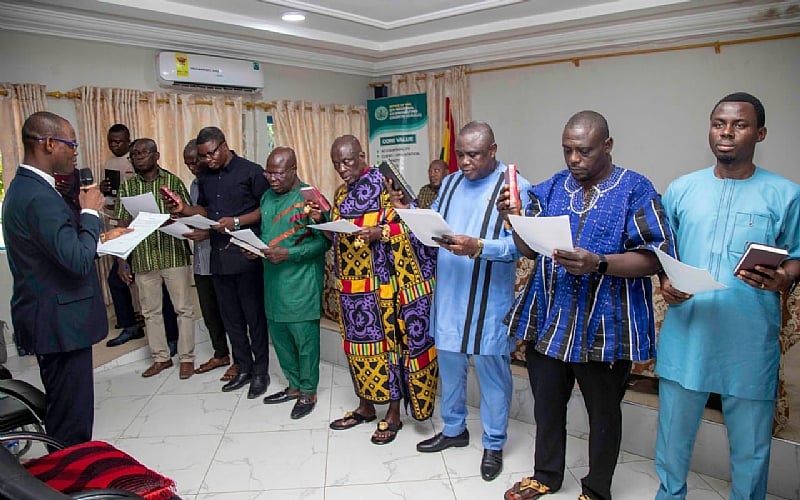The inauguration of the 16-member Oti Regional Lands Commission board on May 22, 2025, signifies a pivotal moment in the region’s developmental trajectory. This milestone, spearheaded by the Oti Regional Minister, Hon. John Kwadwo Gyapong, underscores the government’s commitment to decentralized governance and efficient land administration. The establishment of the commission’s office, a direct response to the appeals of the Oti people, is poised to streamline land management processes, fostering equitable access and sustainable utilization of land resources for the benefit of all stakeholders. The board’s diverse composition, drawing from a wide range of expertise and community representation, strengthens its capacity to address the multifaceted challenges inherent in land administration.
Chaired by Nana Mprah Besemuna III, the board comprises individuals with varied backgrounds and expertise, reflecting the region’s diverse demographics and the need for inclusive decision-making in land management. The membership includes Yaw Acheampong Amoah, Gazekpo Emmanuel, Felix Kwamla Seloame, Nana Akoto Musakyi III, Cyril Gadegbeku, John Mark Bekoe, Anebo Philip Kwaku, Akoporwiah Nathaniel, Ladzi Emmanuel, George Grant Dogli, Nana Sampson Fordjour, Richard Opoku, Fankibi Joseph, Silas Atikpo Brownson, and Musah Mumuni Basit. This diverse representation is expected to foster a balanced approach to land administration, incorporating both traditional knowledge and modern practices to achieve optimal outcomes. The board’s composition ensures consideration for various perspectives and interests, promoting transparency and accountability in its operations.
The official inauguration ceremony involved the administration of three crucial oaths: the oath of allegiance, the oath of secrecy, and the oath of office. These oaths serve as solemn commitments, binding the board members to uphold the constitution, protect confidential information, and execute their duties with integrity and diligence. The significance of these oaths underscores the importance of their roles and responsibilities, emphasizing the need for ethical conduct and unwavering dedication to the welfare of the Oti Region. By taking these oaths, the board members publicly affirm their commitment to serving with utmost responsibility and transparency.
Hon. Gyapong emphasized the importance of unity and collaboration within the board, urging members to work together towards a common goal – the sustainable and equitable management of land resources. He stressed the need to prioritize the economic utilization of land while ensuring its long-term sustainability for future generations. This vision emphasizes a balanced approach, recognizing the crucial role of land in economic development while simultaneously protecting its environmental integrity. The Minister’s call for unity underscores the importance of collective action and shared responsibility in achieving the board’s objectives.
Furthermore, Hon. Gyapong issued a stern warning against parochial interests and unethical practices, emphasizing that the ministry will not hesitate to take decisive action against any board member found to be in violation of the law. This firm stance against corruption and self-serving behavior reinforces the government’s commitment to transparency and accountability in land administration. The minister’s clear message serves as a deterrent against any potential misconduct, ensuring that the board operates with integrity and in the best interest of the Oti Region. This proactive approach aims to maintain public trust and confidence in the newly established commission.
The newly inaugurated board is entrusted with the critical responsibility of managing both private and public lands within the Oti Region. This comprehensive mandate requires a strategic approach that balances the rights of individual land owners with the overall developmental needs of the region. The board is tasked with implementing policies that promote fair and equitable land distribution, preventing land disputes, and facilitating efficient land transactions. The board’s role extends beyond mere administration; it is expected to actively contribute to the region’s economic growth by ensuring responsible and sustainable land use practices. This includes facilitating access to land for investment, promoting agricultural development, and protecting environmentally sensitive areas. The board’s success will be crucial in shaping the region’s future prosperity and ensuring the equitable distribution of its land resources.














